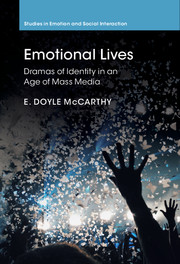The Age of the Crowd
A Historical Treatise on Mass Psychology
- Authors:
- Serge Moscovici
- Date Published: September 1985
- availability: Available
- format: Paperback
- isbn: 9780521277051
Paperback
Looking for an inspection copy?
This title is not currently available on inspection
-
The Age of the Crowd is at one level an historical account of the development of mass psychology, and at another an analysis of its implications for prevalent political and social life. It was the prophecy of Gustave Le Bon in 1895 that the twentieth century would be 'l'âge des foules' that gave Serge Moscovici the title for his book, and it presents a systematic exposition of Le Bon's ideas and those of Gabriel Tarde, demonstrating convincingly their influence on the theories of collective psychology advanced by Sigmund Freud. These theories are re-examined by Professor Moscovici in a fascinating commentary on political life: Hitler, Mussolini, Lenin, Stalin and Trotsky all in some way applied them in their leadership styles with consequences that are all too familiar. The scenario painted by this volume is a disturbing one. Serge Moscovici's acute analyses of mass phenomena raise fundamental questions concerning the foundations of democracy.
Customer reviews
Not yet reviewed
Be the first to review
Review was not posted due to profanity
×Product details
- Date Published: September 1985
- format: Paperback
- isbn: 9780521277051
- length: 418 pages
- dimensions: 229 x 152 x 24 mm
- weight: 0.61kg
- availability: Available
Table of Contents
Author's note
Introduction
Part I. The Study of the Masses:
1. The individual and the masses
2. The revolt of the masses
3. What do we do when faced with the masses?
4. Eastern and western varieties of despotism
Part II. Le Bon and the Fear of Cowards:
1. Who was Gustave Le Bon?
2. The Machiavelli of mass societies
3. Four reasons for saying nothing
4. The discovery of the masses
5. Mass hypnosis
6. The mental life of crowds
Part III. The Crowd, Women and Madness:
1. Collective matter: the impulsive and conservative crowd
2. Collective form: the dogmatic and utopian crowd
3. The leaders of the crowd
4. Charisma
5. The strategies of propaganda and mass suggestion
6. Conclusion
Part IV. The Leader Principle:
1. The paradox of mass psychology
2. Natural crowds and artificial crowds
3. The leader principle
Part V. Opinion and the Crowd:
1. Communication is the valium of the people
2. Opinion, the public and the crowd
3. The law of the polarisation of prestige
4. The Republic in France: from a democracy of the masses to a democracy of publics
Part VI. The Best Disciple of Le Bon and Tarde: Sigmund Freud:
1. The black books of Dr Freud
2. From classical to revolutionary mass psychology
3. The three questions of mass psychology
4. Crowds and the libido
5. The origin of affective attachments in society
6. Eros and mimesis
7. The end of hypnosis
Part VII. The Psychology of the Charismatic Leader:
1. Prestige and charisma
2. The postulate of mass psychology
3. The primal secret
Part VIII. Hypotheses About Great Men:
1. 'The man Moses'
2. The family romances of great men
3. Creating a people
4. Mosaic and totemic leaders
Part IX. Secular Religions:
1. The secret of a religion
2. The prohibition of thought
3. The cult of the father
Conclusion: the planetary age of the crowd
Notes
References
Index of names
Subject index.
Sorry, this resource is locked
Please register or sign in to request access. If you are having problems accessing these resources please email [email protected]
Register Sign in» Proceed
You are now leaving the Cambridge University Press website. Your eBook purchase and download will be completed by our partner www.ebooks.com. Please see the permission section of the www.ebooks.com catalogue page for details of the print & copy limits on our eBooks.
Continue ×Are you sure you want to delete your account?
This cannot be undone.
Thank you for your feedback which will help us improve our service.
If you requested a response, we will make sure to get back to you shortly.
×









